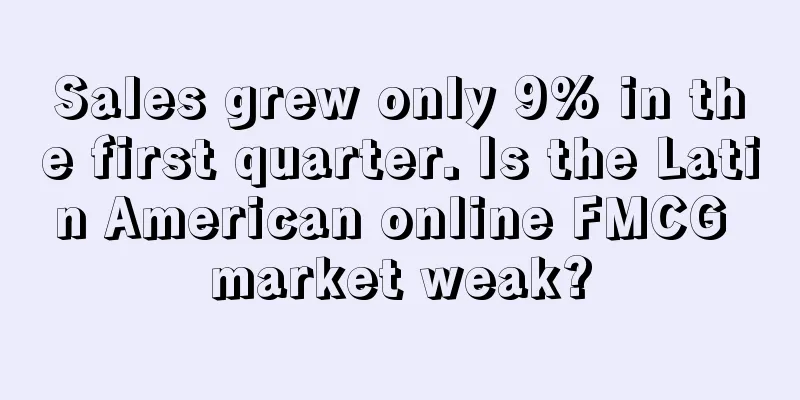Sales grew only 9% in the first quarter. Is the Latin American online FMCG market weak?

|
It is understood that due to the increase in product prices caused by costs and inflation, consumers are limiting their purchasing desires in order to reduce spending, a phenomenon that is particularly evident in fast-moving consumer goods . Over the past year, sales of fast-moving consumer goods in Latin America have continued to grow by double digits, but in the first quarter of this year , it fell to 9% , and the frequency of fast-moving consumer goods purchases was lower than before the epidemic .
It is worth noting that consumers behave differently across countries and socioeconomic levels ( SEL ) . Mexico is one of the countries where online sales of FMCG products remain above pre- pandemic levels.
In contrast, consumers in Brazil, Colombia and Argentina are experiencing the greatest economic pressures. The changes can be seen in the online spending categories, with Brazil moving from the lowest online spending on food to the highest online spending category .
After two years of the pandemic , 14% of households in Latin America purchased fast-moving consumer goods online. In Chile, the penetration rate of online shopping was eight times higher than before the pandemic , while in Brazil it doubled .
Different economic realities mean different consumer responses. It is understood that in Colombia and Argentina , online consumers are reducing the categories of FMCG purchased online and buying cheaper FMCG at reduced prices to make online spending more rational .
In Brazil, affected by inflation, online consumers have begun to turn to low-end brands in order to buy more fast-moving consumer goods to meet basic living needs .
While overall FMCG sales and volumes have declined in Latin America so far, the online food category is on the rise. The number of online food buyers increased in Q3 2021 compared to Q1 2019. Across Latin America, 64% of online food consumers are from lower socioeconomic regions , while 59% are from higher socioeconomic regions .
In addition, according to Kantar data, 44% of online consumers in Latin America are very concerned about environmental issues and pay special attention to environmental protection and energy-saving practices of packaging and products when choosing to buy . At the same time, more than one-third of online shoppers said that many products do not carry relevant labels such as " environmental protection ", " green " and " natural " , which will affect the relevance and accuracy of product searches.
To understand the Latin American market, sellers need to understand the latest market trends and prepare products with high demand and high sales for the market . Latin America Fast Moving Consumer Goods |
>>: Criminals impersonate official identities to commit fraud, Lazada issues a serious warning
Recommend
Kuaishou's overseas version Zynn is shut down
Recently, there was news that Kuaishou will offic...
Anker vigorously develops the domestic market! Cross-border sales are accelerating the process of getting rid of platform dependence
Under this wave of rectification by Amazon, some ...
Amazon expands its “same-day delivery” service, with delivery in as fast as 5 hours!
Amazon announced on Sept. 23 that it was expandin...
"It can save lives at critical moments"! The number of independent station sellers has reached 200,000
Recently, third-party platforms have been vigorou...
The parent company has nearly 200 million yuan in outstanding debts, and part of Youkeshu’s equity may be sold off
In recent years, the domestic cross-border e-comm...
What is Lotte Korea & Lotte Korea Review: Features, Pros & Cons, and Best Use Cases
Lotte Group (English: Lotte Co., Ltd., Japanese: ...
Supporting the promotion of textile waste recycling, SHEIN EPR Fund donates to UnTours Foundation
Recently, the SHEIN EPR ( Extended Producer Respo...
"Order in the morning, delivered in the afternoon" has become the norm in Guangdong, and Tmall Supermarket's South China Central Warehouse is open today
On the morning of March 1, Tmall Supermarket and ...
What is Urban Seller? Urban Seller Review, Features
<span data-docs-delta="[[20,{"gallery"...
Sales soared 23,000%, and this product on Amazon became popular
Although it is not yet the season to lie on the b...
Net sales of $874 million, record sales for Mattel in the U.S.
Relevant data shows that in the first quarter of ...
It’s hard! Another e-commerce platform declared bankruptcy
It seems that the collapse of e-commerce platform...
How to achieve a soft landing: Amazon sets an example for the US economy
Amazon's e-commerce business experienced a re...
What is Depoga? Depoga Review, Features
Depoga (Depoga Technology Development Co., Ltd.) ...
What is KnownOrigin ? KnownOrigin Review, Features
KnownOrigin is a marketplace for discovering and ...









